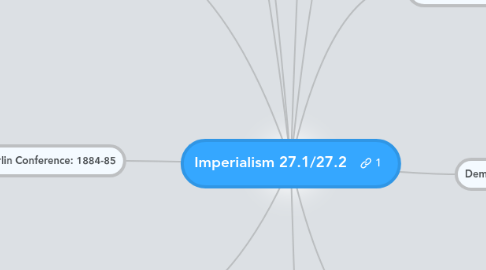
1. Berlin Conference: 1884-85
1.1. Rules for claiming lands created
1.1.1. Notify other countries
1.1.2. Prove to be able to control area
1.2. Called to prevent conflict
1.3. 14 European nations
1.4. No regard to African's wants
1.4.1. No African ruler called to meeting
1.4.2. Disregarded imaginary social divisions of different social groups within Africa
2. Congo
2.1. Sparked Interest in imperialism
2.2. David Livingstone
2.2.1. Missionary from Scotland
2.2.2. Never returned
2.2.2.1. People thought he died
2.2.2.2. Stanley found him
2.2.2.2.1. King Leopold II became interested
3. 3 Groups clashed over South Africa
3.1. British
3.2. Dutch (Boers)
3.2.1. First to settle in South Africa
3.2.2. Took lands to make large farms
3.2.3. Great Trek
3.3. Africans
3.3.1. Zulus fought British invaders
3.3.2. Shaka
3.3.2.1. Strong Zulu Chief
3.3.2.2. Centralized state
3.3.2.2.1. Military organization
3.3.2.2.2. Disciplined warriors
3.3.3. Cetshwayo
3.3.3.1. Zulu King
3.3.3.2. Refused to accept British rule
3.3.3.3. Lost at Battle of Ulundi
3.3.3.4. Fell to British in 1887
4. Boer War
4.1. 1st total war
4.1.1. Commando raids
4.1.2. Guerrilla war tactics
4.1.3. Concentration Camps
4.2. British v. Boers
4.2.1. British won
4.2.1.1. 1910
4.2.1.2. Boer Republic--> Self governing Union of South Africa
4.3. Boers Blamed British after a failed rebellion
4.3.1. Diamond and gold discoveries brought people from all over
4.3.2. Wanted to keep outsiders from gaining political righs
5. Overall Negative Effects
5.1. Deaths from new diesase
5.2. Poor division of Africa
5.2.1. Improperly linked opposing social groups
5.2.2. Caused issues in nations that evolved from those colonies
5.3. Famines
5.4. Africans lost independance
5.5. Traditional cultural breakdown
5.6. Africans lost land
6. Driving Forces in African Imperialism Sepcifically
6.1. European technological Superiority
6.1.1. Maxim Gun
6.1.1.1. 1884
6.1.1.2. 1st automatic machine gun
6.1.2. Africans relied on old weapons
6.1.3. Inventions
6.1.3.1. Steam engine
6.1.3.1.1. Easy travel
6.1.3.1.2. Established bases deep in Africa
6.1.3.2. Close communications
6.1.3.2.1. Railroads
6.1.3.2.2. Cables
6.1.3.2.3. Steamships
7. Forms of Control
7.1. Colonial Control
7.1.1. Economic Imperialism
7.1.2. Sphere of Influence
7.1.3. Protectorate
7.1.4. Colony
7.2. Day-to-Day Management
7.2.1. Direct Control
7.2.2. Indirect Control
7.2.2.1. Relied on existing rulers
7.2.2.2. Local officials dealt with daily management
8. Driving Forces
8.1. Industrial Revolution
8.1.1. New markets
8.1.2. Raw materials
8.2. National Pride
8.2.1. Social Darwinism
8.2.1.1. Social theory
8.2.1.2. Fittest for survival enjoyed wealth and success, superior to others
8.2.1.3. Europeans, being superior saw it their duty to bring progress to other countries
8.3. Missionaries
8.3.1. Worked to convert Asia, Africa, and Pacific Islands to Christianity
8.3.2. Wanted to Westernize foreigners
9. Demoting Factors
9.1. Malaria
9.1.1. Carried in mosquitoes
9.1.2. Confined Euros to the African coasts
9.1.3. Quinine created in 1829
9.2. Variety of cultures and languages
9.2.1. Wars between ethnic groups
9.2.1.1. trade rights
9.2.1.2. land
9.2.1.3. water
9.2.2. Discouraged unity
9.2.3. 3 major social groups
9.2.3.1. Huasa-Fulani
9.2.3.2. Yoruba
9.2.3.3. Igbo
10. African Resistance
10.1. Maji-Maji rebellion
10.1.1. Spiritual defense
10.1.2. Resistance to Germans push to plant cotton
10.1.3. Magic water sprinkled on their bodies would protect them
10.1.4. 75,000 died
10.1.4.1. Germans shaken
10.1.4.2. Led to the push to make colonization more acceptable to Africans
10.2. Surprising military strength
10.2.1. Ultimately always failed
10.3. Ethiopia successful
10.3.1. Led by Menelik II
10.3.1.1. Emperor in 1889
10.3.1.2. Signed treaty with Italy
10.3.1.2.1. Accidentally agreed to a protectorate
10.3.1.2.2. Declared war
11. Overall Positive Effects
11.1. Reduced Local warfare
11.2. Provided hospitals and schools
11.2.1. Life spans increased
11.2.2. Literacy rates improved
11.3. Improved sanitation
11.4. Economic Expansion
11.4.1. African products available internationally
11.4.2. Railroads, dams, telephones, telegraph lines
